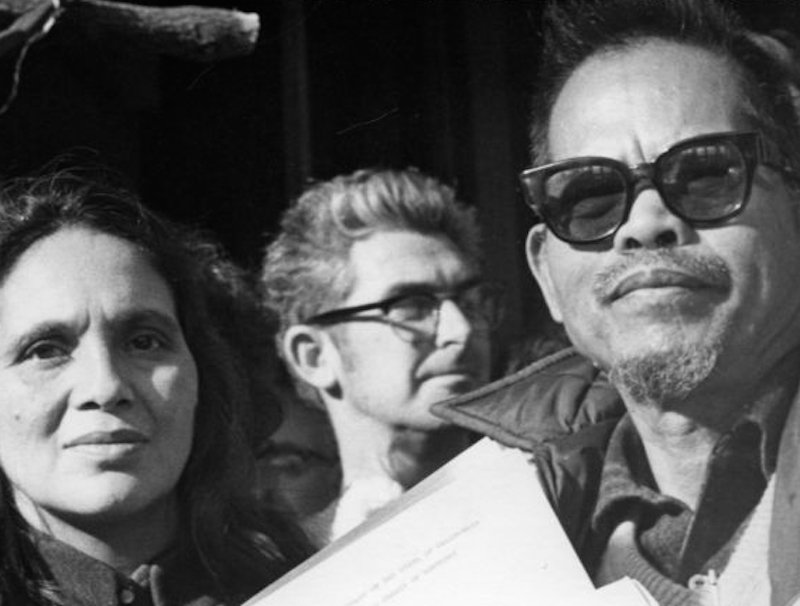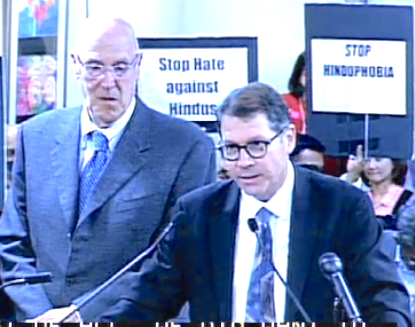
Black teachers: How to recruit them and make them stay

Lessons in higher education: What California can learn

Keeping California public university options open

Superintendents: Well-paid and walking away

The debt to degree connection

College in prison: How earning a degree can lead to a new life

After listening to five hours of charged disagreements by Hindus, Muslims and others on how their religions and culture should be depicted in California classrooms, the State Board of Education adopted new social science guidelines Thursday that will stress teaching critical thinking and objective inquiry so that students can determine historical truths for themselves.
“We are not the arbiter of historical debate,” State Deputy Superintendent of Public Instruction Tom Adams, who oversaw the process of approving the guidelines, told the state board. “We will turn it over to students to make their own judgment.”
Seven years in the making and hundreds of pages in length, the new History-Social Science Framework was suspended in 2009 during the economic recession and revived two years ago. The framework is not a curriculum or a textbook; it’s an instruction guide for teachers on the state’s K-12 history and social science standards.
The standards haven’t been updated since 1996 but the new framework will serve as a historical update and the basis for publishers to rewrite K-8 textbooks, which they will start submitting for approval next year. High schools choose their own materials.
The standards lay out topics and events that students should learn and when they should learn them, such as California history in grade 4; U.S. history in grades 5, 8 and 11; world history in grades 6, 7 and 10; and civics/democracy in grade 12. The Legislature has weighed in too, mandating in the past several years the instruction of financial literacy, Filipino-American contributions to the labor movement and World War II, the Armenian Genocide, President Barack Obama, and voter education. The FAIR Education Act requires the inclusion of lesbian, gay and transgender history and key figures.
Teachers and historians wrote the framework, incorporating the Legislature’s instructions. The state’s Instructional Quality Commission, led by Chair Lauryn Wild and former state Superintendent Bill Honig, the vice chair, organized the process, reviewed and revised the document and held extensive public hearings.
The framework stresses the importance of incorporating diverse historical perspectives of Hispanics, Native Americans and other ethnic groups. And the work of the commission may not be done. If Assembly Bill 2016, by Assemblyman Luis Alejo, D-Salinas, passes, the commission would be charged with creating a model curriculum for a high school ethnic studies course.
Immigrant groups, particularly from India, have been especially vigilant – and vocal – about references in the framework to their homelands and religions. Some Hindu groups opposed any reference to the caste system, while other Hindus expressed anger over a lobbying effort to whitewash caste persecution. The frameworks will keep the reference.
Muslims criticized a reference to forced conversion by Islamic rulers on the Indian subcontinent centuries ago. There were a record 10,000 emails, 1,000 suggested revisions and hundreds of speakers on these and other issues at hearings. Adams said that every comment was registered and responded to. Language was massaged and revisions were made, Adams said, to strike the balance of sensitivity and accuracy.
Well-organized Hindu-American groups pressed legislators to support their cause. Lt. Gov. Gavin Newsom, a likely gubernatorial candidate, backed their cause in a letter to the state board. “I strongly encourage you to consider the perspective of young Indian-American and Hindu-American students” and whether the proposed framework accurately portrays their history, he wrote. “If you agree that it does not, I hope you will consider making the appropriate modification.”
A caravan of speakers lobbied one last time in one-minute comments on Thursday. Middle school Hindu students said that false references to their religion would lead to bullying. They said they felt demeaned by a section on Hinduism in a textbook accompanied by a photo of women picking through a mountain of trash.
Speakers carried signs reading, “Stop Islamophobia” and “Stop Hinduphobia.” Elderly Japanese denied that South Korean women were forced to become prostitutes during World War II.

California Department of Education webcast.
Deputy Superintendent of Public Instruction Tom Adams, right, and Bill Honig respond to questions about the framework during a hearing Thursday.
Honig and Adams said the references to Korean comfort women would remain, but they agreed to tweak the language referring to Muslim conversion. The framework includes “positive facts about each religion, but we did not want to neglect negative facts” like the caste system – just as the framework includes sections on slavery in America and serfs in Russia.
State board member Patricia Rucker, the board’s liaison to the Instructional Quality Commission, thanked speakers for expressing their “pain and concerns” and praised Adams and other drafters for taking their views seriously. The new framework is “remarkable and unique” and will lead to a better curriculum and textbooks, she said.
The framework includes an appendix on civic education and service learning that includes examples of projects and activities that will encourage students to become active in community issues and problems. Adams and Honig said this focus represents a far different approach than the rote teaching of democracy that typified many civics classes in the past.

Panelists discussed dual admission as a solution for easing the longstanding challenges in California’s transfer system.

A grassroots campaign recalled two members of the Orange Unified School District in an election that cost more than half a million dollars.

Legislation that would remove one of the last tests teachers are required to take to earn a credential in California passed the Senate Education Committee.

Part-time instructors, many who work for decades off the tenure track and at a lower pay rate, have been called “apprentices to nowhere.”
Comments (6)
Comments Policy
We welcome your comments. All comments are moderated for civility, relevance and other considerations. Click here for EdSource's Comments Policy.
Clayton Moore 8 years ago8 years ago
The new framework seems to acknowledge different perspectives of many cultures and sexual identities. The service projects replacing rote democracy facts sound interesting...if the civics facts, such as the Constitution and separation of powers are built into the curriculum. Much social change since 1996. I appreciate the efforts of the committee to chart all responses submitted. On the issue of Korean comfort women, this was taught on Okinawa, along with other atrocities committed by … Read More
The new framework seems to acknowledge different perspectives of many cultures and sexual identities. The service projects replacing rote democracy facts sound interesting…if the civics facts, such as the Constitution and separation of powers are built into the curriculum. Much social change since 1996. I appreciate the efforts of the committee to chart all responses submitted. On the issue of Korean comfort women, this was taught on Okinawa, along with other atrocities committed by the defeated empire of Japan. Internet access will add detail to support opinions. Awareness of change in context and perspective of viewing history seems well reflected by the process.
Deb Jensen 8 years ago8 years ago
The process as described in this article for updating the framework is itself an example of participatory democracy. California models a respectful path to inclusivity.
Murahara 8 years ago8 years ago
There is an error in this article: None of the Hindu groups opposed reference to the caste system. All of the Hindu groups stated caste needed to be discussed but as a social structure that became conflated with religion from the 2nd century onwards (not in vedic times). It was also important to stress that many Hindu reformers from the 9th century onwards spoke out against caste discrimination and those religious movements are still prominent … Read More
There is an error in this article: None of the Hindu groups opposed reference to the caste system. All of the Hindu groups stated caste needed to be discussed but as a social structure that became conflated with religion from the 2nd century onwards (not in vedic times). It was also important to stress that many Hindu reformers from the 9th century onwards spoke out against caste discrimination and those religious movements are still prominent today. The state board should have incorporated a more nuanced discourse about this issue in the textbooks.
Jim Mordecai 8 years ago8 years ago
Civics should be better taught as not history but as right and responsibility of citizens to take part in decision making of our Republic. Students are also citizens and would benefit from attending local school boards and commissions and taking a position pro or con on local issues. Participation in local decision making is just not adequately taught or valued. Students are citizens whose participation or non-participation will shape whether we remain Lincoln's … Read More
Civics should be better taught as not history but as right and responsibility of citizens to take part in decision making of our Republic. Students are also citizens and would benefit from attending local school boards and commissions and taking a position pro or con on local issues. Participation in local decision making is just not adequately taught or valued. Students are citizens whose participation or non-participation will shape whether we remain Lincoln’s vision of a Republic of the people, by the people and for the people.
Heidi Weiland 8 years ago8 years ago
But will it include Mendez vs. Westminster? A critically important piece in California’s history and the civil rights movement.
Replies
John Fensterwald 8 years ago8 years ago
Heidi: I did see it referred to on page 597, Chapter 17 for the 12th grade course on Principles of American Democracy. It discusses important civil rights cases. Here again is the link to the framework.